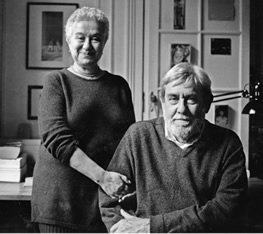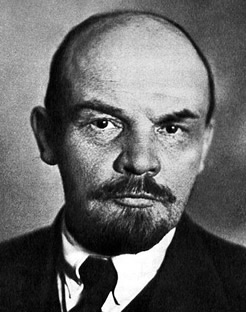 richard pevear (1943- )
richard pevear (1943- )
"The nameless hero — nameless 'because 'I' is all of us,' the critic Viktor Shklovsky suggested — is, like so many of Dostoevsky's heroes, a writer. Not a professional man of letters (none of Dostoevsky's 'writers' is that), but one whom circumstances have led or forced ..
.. to take up the pen, to try and fix something in words, for his own sake first of all, but also with an eye for some indeterminate others — readers, critics, judges, fellow creatures.
He is a passionate amateur, a condition that marks the style and structure as well as the content of the book.
Whereas the master practitioner would present us with a seamless and harmonious verbal construction, the man from underground, who literally cannot contain himself, breaks decorum all the time, interrupts himself, comments on his own intentions, defies his readers, polemicizes with other writers." ■
This passage is taken from the introduction .. to Notes from Underground (1864), translated from the Russian by Richard Pevear and his Russian-born wife, the obviously devoted Larissa Volokhonsky, who is also a co-translator with Richard (.. which is why I chose a photo that includes her).
I hear they live in Paris .. with "two trilingual children" (English, French & Russian?). How cool!
This passage is basically the second paragraph of the 14-page intro, penned by Pevear. Sometimes I feel like the Underground Man.
I have much more to say about this passage, which I will return to in the future. But for now, let me begin by saying » "I can relate."
I feel grateful to these people for their efforts .. to translate such important works. Important in multiple ways.
 » Translator Smackdown
» Translator Smackdown
Permit me to share with you the juiciest part of Pevear's intro .. to Notes from Underground. It comes right at the end.
Now, these two people seem and appear so sweet .. do they not? (Yes, they do.)
But! Richard busts a move at the end of his intro (xxii) and layeth down some serious translator-smack. My eyebrows lifted .. all by themselves. "Whoa" .. where he writes »
The opposite of zloy is dóbryi, "good," as in "good fairy" (dóbraya féla). This opposition is of great importance for Notes from Underground; indeed it frames the book, from "I am a wicked man" at the start to the outburst close to the end: "They won't let me .. I can't be .. good."
We can talk forever about the inevitable loss of nuance in translating from Russian into English (or any other language into any other), but the translation of zloy as 'spiteful' instead of 'wicked' is not inevitable, nor is it a matter of nuance.
Dude, does that not feel like some translator somewhere just got their face slapped? I mean, you merely need to add a 'bee-iatch' at the end and you have Tolstoy-style gangsta smackdown.
» They Won't Let Me Be Good
But notice in particular the phrase (the outburst at the end) » "They won't let me .. be good."
Think about that for a minute. What does that mean? Why won't they let him be good?
The Habit of Substituting the » Psychological for the Moral
He goes on to say (even more interestingly) »
It speaks for the habit of substituting the psychological for the moral [say WHAT?] .. of interpreting a spiritual condition as a kind of behavior, which has so bedeviled our century, not least in our efforts to understand Dostoevsky.
I may need to think about that for a while. In order to glean the full insight of what he is saying. But I can't help but think » they would know. Both he and Larissa.
 Update - I have thought about what he says in the last paragraph of his enlightening intro, and I am not sure why it took me so long to "get it".
Update - I have thought about what he says in the last paragraph of his enlightening intro, and I am not sure why it took me so long to "get it".
He is talking about (no doubt, with input from the misses) about translating the Russian word zloy in the traditional manner of 'spiteful' vs 'wicked,' which he insists in the correct translation.
He says that spiteful = the psychological behavior, while wicked is a spiritual/moral condition. This, actually, if you think about it (I have) is a deep conversation all its own, which is probably too much for this quotes page.
The effect, for me, was similar to the cool insight I got when I "saw into" Kafka's quote.
But beyond that deep conversation .. about spiritual conditions being interpreted as and being substituted by psychological behaviors .. that "has so bedeviled our century" .. which calls to mind both BF Skinner [ Beyond Freedom & Dignity ] and the shortcomings of our criminal "justice" system ..
.. the cool thing here .. is that, he ends his intro by discussing the VERY FIRST sentence of the novel. So he sort of dumps you off at the entrance ..
.. after showing you that he does indeed know what he is talking about, which gives you-the-reader confidence in the accuracy of the story you are about to read.
Not sure if he planned it like that .. but it works well. You feel like a limo has dropped you off at the front gate to the Russian embassy .. after serving you caviar with a shot of Stoli. "I'm pumped. Let's DO this thing."
I really like this guy .. because the spiritual vs psychological is a sophisticated discussion, and he jumps in with both feet .. wielding a mace .. just as Dostoevsky did.
» First Existential Novel (1864) = the Dividing Line of the Centuries
Notes from Underground has been called » "the DIVIDING LINE between nineteenth and twentieth century fiction, and between the visions of self each century embodied."
Think about that for a minute. This little book provides you with the (intellectual) vantage point whereby you are able to gain a perspective from which you are able to see both the nineteenth and twentieth centuries .. and particularly the transistion .. from one to the other.
Is it just me? .. or does that not sound like a very cool thing?
Would not you normally expect this book .. that represents the dividing line between the nineteenth and twentiest centuries .. would not you normally expect this book to be written in 1898 or 1899? Or, at least, some time during the 1890? No? Closer to the actual (chronological) dividing line.
Does this book being published in 1864 give Dostoevky any 'prophetic' kudos? For being a seer of sorts .. able to see into the essence of the next century .. from 35 years away?
It does indeed seem that way, no?
I also took note that Notes from Underground (1864) came BEFORE all of Dostoevsky's 'great' novels .. beginning with Crime & Punishment (in 1866).
Does 'Notes' being the 'dividing line' mean that Crime & Punishment (and therefore all subsequent novels published by Dostoevsky) is (are) a 'twentieth century' novel?
I think not. Dostoevsky is known as a nineteenth century writer. Not a twentieth century writer.
But I think, perhaps, that his prophetic qualities and traits may somehow 'push' his work into the next century.
» Most Revolutionary Novel
It has also been called » "Dostoevsky's most revolutionary novel".
Demons, I hear, is also revolutionary. The "best book ever" on the subject of revolutionary conspiracy. Wow there's a subject for you. No, I have not read Demons. But this is the guy who Dostoevsky is responding to. And when Joseph Frank describes the story, it makes your mouth water.
And also » "the first existential novel". [ Notes from Underground. ]
You can perhaps glean more insight regarding this quote and why Dostoevsky's thin title speaks to me » Notes from Underground (to Snowden).
» Arriving at the Full Music of this Underground Oratorio
Near the end of Pevear's intro to » Notes from Underground .. where we feel the climax of his intro coming ..
 .. he writes this »
.. he writes this »
"Another of the underground man's words is » vygoda, which means 'profit' (gain, benefit), and only secondarily 'advantage' as it is most often translated. 'Profit' has very nearly the same range of uses in English as vygoda does in Russian.
It is a direct, unambiguous word, with an almost tactile quality: you have an advantage, but you get a profit. And like vygoda, with its strongly accented first syllable, 'profit' leaps from the mouth almost with the force of an expletive, quite unlike the more unctuous 'advantage' or its Russian equivalent preimushchestvo. Again, the narrator insists on his work and plays with it. Thus we arrive at the full music of this under-ground oratorio."
Reasonably Profitable Wanting vs » Independent Wanting (What Man Needs)
Then Pevear quotes Dostoevsky himself (this is beautiful, so cool) .. see here »
» And where did all these sages get the idea that man needs some moral, some virtuous wanting? What made them imagine that what man needs is a reasonably profitable wanting? Man needs only independent wanting, whatever this independence costs, and wherever it may lead.
It's a big thought .. very big. You will have the coolest dreams tonight.
After I read that passage and sat back to ponder what he was saying .. I thought about what Paul wrote to the Romans ..
.. when he said that children of God are to be led by » the Spirit of God. (Not by some man .. no matter how well intentioned.)
And remind me to tell you about how the Underground man's quote here reminds me of the thing that makes a shitty parent shitty.
Notes from Underground is a » Response to Nikolai Chernyshevsky
Notes from Underground is a reponse to a book published the year prior (in 1863) by Nikolai Chernyshevsky (1828-1889, born the same year as Tolstoy), who was the chief spokesman of the young radicals. Dostoevsky was 7 years older than Chernyshevsky.
In 1863, Chernyshevsky published a book titled » What Is to Be Done? .. which was written the year prior (in 1862) while Chernyshevsky was in prison for "revolutionary activities".
 What Is to be Done? is the book that would, decades later, turn Lenin (1870-1924) into a "confirmed revolutionary". [ Lenin thought that Dostoevsky and his writings sucked. ]
What Is to be Done? is the book that would, decades later, turn Lenin (1870-1924) into a "confirmed revolutionary". [ Lenin thought that Dostoevsky and his writings sucked. ]
It was in this book that Chernyshevsky wrote »
» Yes, I will always do what I want. I will never sacrifice anything, not even a whim, for the sake of something that I do not desire. What I want, with all my heart, is to make people happy. In this lies my happiness. Mine! Can you hear that, you in your underground hole?
This was the passage that led Dostoevsky to take up the challenge against the utopian socialists.
» Dostoevsky & the Ideology Behind the Bolshevik Revolution
Along these lines of Dostoevsky being on the right side of history (propheticly, no less).. Josph Frank writes in the preface to his 2009 bio on Dostoevsky » A Writer in His Time, which is itself a distillation of his 5-volume, 2,500-page 'monumental' bio (1976-2002) ..
.. where he writes »
"As a result of the Bolshevik Revolution (of October, 1917), it became difficult for Russian scholars, up until very recently, to study Dostoevsky impartially and objectively. His greatest works, after all, had been efforts to undermine the ideological foundations out of which that revolution had sprung, and it was thus necessary to highlight his deficiencies rather than his achievements."
» Joseph Frank on the Ideological Battle Waging Behind Notes from Underground
Joseph Frank (1918-2013, same as Mandela btw) who spent 30 years researching Dostoevsky, and who wrote the finest biography on Dostoevsky (A Writer in His Time) .. mentions Notes from Underground in the preface to his bio.
Here is the entire parapraph, which I will break up into bite-sized chunks for easier readability. I found this very illuminating. See if you agree.
When he returned after a 10-year Siberian exile, he thus found it impossible to accept the reigning ideas of the new generation in the 1860's that had arisen during his absence.
Promulgated by Nikolay Chernyshevsky, these ideas were a peculiar Russian mix of atheism, materialism and rationalism of eighteenth-century French thought, and the English Utilitarianism of Jeremy Bentham.
Russian radicalism has acquired a new foundation, labeled 'rational egoism' by Chernyshevsky, that the post-Siberian Dostoevsky found impossible to accept.
The first important work that he launched against this new credo was Notes from Underground, in which the underground man's belief in the determinism of all human behavior — a determinism asserted by Chernyshevsky to be the final, definitive word of science — clashed irresistibly with the moral sensibilities that, despite his desire to do so, the tormented underground man cannot supress.
Joseph Frank shines a bright light on Dostoevsky and on his world .. I am discovering.
In 2009, he released a condensed version of the 5-volume, 2,500-page mother-of-all-literary-bio's that he had written (1976-2002). What a work. Most impressive.
Joseph Frank, and his impressive bio, is very much about shedding light on the ideological conflicts that form the (real-life) background for Dostoevsky's ( 'fictional' ) major novels. Which, I must say, greatly illuminates the novels' backstory.
The bio is so good that you feel a sense of privilege from reading it. You feel fortunate.
The end. ■■
For more along these lines, here's a Google search preconfigured for the query » richard pevear translation notes from underground fyodor dostoevsky